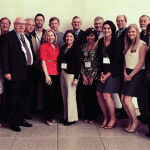
Thinglass/shutterstock.com
Last year, the Foundation formed a Strategic Planning Task Force, consisting of patients and rheumatology professionals from every aspect of the field, including investigators, academicians, clinicians and health professionals. Mary Wheatley, IOM, CAE, executive director of the Foundation, explains, “We focused on determining what would most benefit rheumatology professionals and the patients they treat. We believe the priorities we laid out—value, treatments and cures—will push forward efforts to provide patients with the access to care and treatment options they need, and the Foundation has shown it can do just that.”
In fiscal year 2016, the Foundation committed $13,198,500 to attracting the brightest minds to the field, supporting their education and training and encouraging research that will lead to major breakthroughs. The Foundation will continue these efforts to meet the demands of a growing patient population. Over the next five years, the Foundation will work to increase the number of opportunities for training and mentoring of future rheumatologists.
Patient treatments have come a long way since the Foundation was established in 1985, but there is still so much to discover. To increase treatment options and potential for a cure, the Foundation will be expanding the scope of funding opportunities to promote new research directions. In addition to finding a cure, members will be encouraged to identify new ways of administering patient care and demonstrating the value of rheumatology care.
Although the Foundation is the largest private funding source for rheumatology research and training in the U.S., the ultimate goal of finding a cure will require additional support, and so a focus on developing meaningful partnerships will also be a priority. Finding additional funding sources will always be needed, but looking for other organizations, institutions and corporations to create mutually beneficial partnerships will also bolster the Foundation’s work to improve patient care.
“Over the past few decades, the Foundation has been dedicated to moving the field forward to better serve its patients, and we have been very successful,” says Ms. Wheatley. “The additional priorities complement our current work well and are another way for the Foundation to encourage more people to conduct critical research and improve the caregiving process and treatment options for people with rheumatic diseases.”

